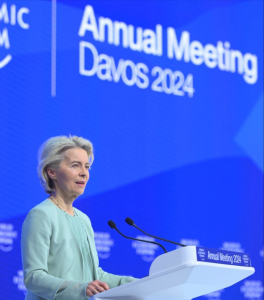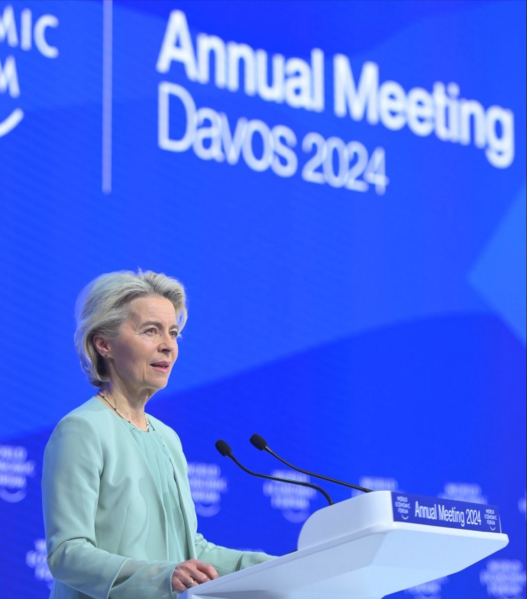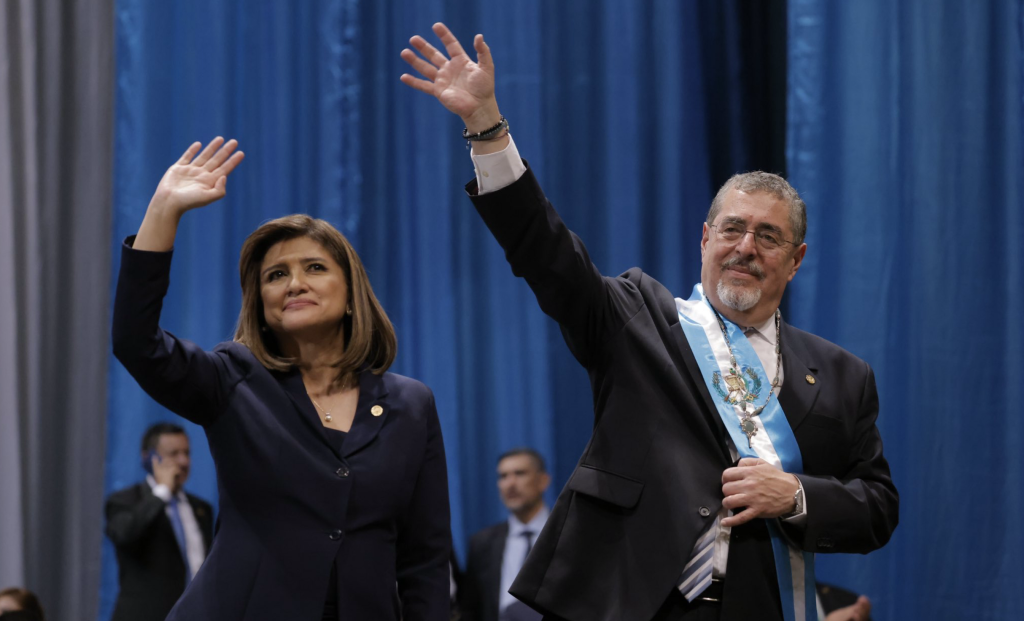
VON DER LEYEN STRESSES IN DAVOS THAT EUROPE MUST LEAD A RESPONSE TO DISINFORMATION
By Julio García
European Commission President Ursula von der Leyen said today, January 16, 2024, that Europe “can and must take the lead” in a global response to the disinformation that will be the main problem for the business community in the next two years.
Speaking at the annual meeting of the World Economic Forum in Davos (Switzerland), Von der Leyen was referring to the Global Risk Report which refers to the serious risk posed by disinformation to the global business community.
“These risks are serious because they limit our ability to address the major global challenges we face: changes in our climate and our geopolitical climate; changes in our demographics and in our technology; spiraling regional conflicts; and intensified geopolitical competition and its impacts on supply chains.”
“The sad reality,” he added, “is that we are once again competing more intensely between countries than we have in several decades. And this makes the theme of this year’s Davos meeting even more relevant. ‘Rebuilding trust’: this is not a time for conflict or polarization. This is a time for building trust. This is the time to boost global collaboration more than ever. This requires immediate and structural responses that are commensurate with the magnitude of the global challenges. I believe it can be done. And I believe Europe can and must take the lead in shaping that global response.”
Von der Leyen clarified that “while governments have many of the levers to address the great challenges of our time, businesses have the innovation, technology and talent to deliver the solutions we need to fight threats such as climate change or industrial-scale disinformation. Europe is in a unique position to demonstrate how this can work. Because our democracies and our businesses have interests that align: creating prosperity, wealth and security for people, creating a stable environment to unlock innovation and investment, and creating equal opportunity and freedom.”
“This is more important than ever as we enter 2024, the most important election year in history. Democracies around the world will go to the polls and half of the world’s population will be affected, including more than 450 million people in the European Union. A Union of 27 democracies where we all have the right to speak our minds, to be ourselves, even if we are different from the majority. In a democracy it is the people, through their choices and behavior, who choose the winners and losers in the economic sphere. Companies are free to compete. Agents of change are free to innovate. Merit determines economic success. And our rules are designed to ensure this: to protect intellectual property, the security of industrial data or the savings of individuals and companies. And Europe stands for global trade based on fair and open markets.”
The Commission President pointed out that, as in all democracies, “our freedom comes with risks. There will always be those who try to exploit our openness, both from within and from outside. There will always be attempts to divert us from the path, for example with disinformation. And nowhere has there been more of that than in the Ukraine issue.”
In this regard, he called for further empowering Ukraine’s resilience against Russia “Ukrainians need predictable funding through 2024 and beyond. They need a sufficient and sustained supply of weapons to defend Ukraine and regain their rightful territory. They need capabilities to deter future Russian attacks. And they also need hope. They need to know that, through their struggle, they will achieve a better future for their children. And Ukraine’s better future is called Europe. It was with immense joy that last month we decided to start negotiations for Ukraine’s membership in the EU. This will be Ukraine’s historic achievement. And it will be Europe answering the call of history.”
Von der Leyen referred again to disinformation, “number one concern of the Global Risk Report: disinformation and misinformation,” and commented that “addressing this has been our focus since the beginning of my term. With our Digital Services Act, we defined the responsibilities of large Internet platforms for the content they promote and propagate. A responsibility to children and vulnerable groups targeted by hate speech, but also a responsibility to our societies as a whole. Because the boundary between online and offline is getting thinner and thinner. And the values we cherish offline must also be protected online. This is even more important in this new era of generative AI.”
“Now, the WEF Global Risk Report places artificial intelligence as one of the top potential risks for the next decade. But let’s not forget that AI is also a very important opportunity, if used responsibly. I am a technological optimist. And as a physician by training, I know that AI is already revolutionizing healthcare. AI can drive productivity at unprecedented speed. The first to advance will be rewarded, and the global race has already begun. Our future competitiveness depends on the adoption of AI in our daily business. And Europe must up its game and show the way towards responsible use of AI.”
He also commented, “When we took office four years ago, we felt the need to set clear barriers at the European level to guide the development and implementation of AI. This is the idea behind Europe’s AI Law, the first of its kind in the world and another example of how democracies and businesses can help strengthen each other. The AI Law builds trust by analyzing high-risk cases, such as real-time biometric identification. And by building that trust, it enables businesses to innovate in all other fields to take full advantage of this revolutionary new technology.”
The Commission President concluded that “the EU is at its best when we are bold, as we have seen in the last few years alone with the European Green Pact, NextGenerationEU, supporting Ukraine or tackling the pandemic. The coming years will require us to think in the same way. And I believe that the common power of our democracies and our businesses and industries will be at the heart of this. Their businesses thrive on freedom: to innovate, invest and compete. But freedom in business depends on freedom in our political systems. That’s why I believe that strengthening our democracy and protecting it from the risks and interference it faces is our common and enduring duty. We need to rebuild trust more than ever, and Europe is poised to play a key role.”
—-
This news was originally published in Aquí Europa, with whose authorization we reproduce it.



